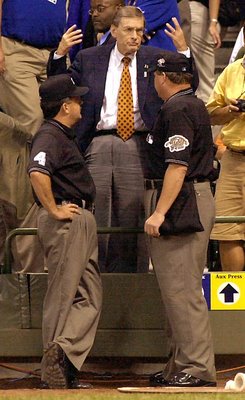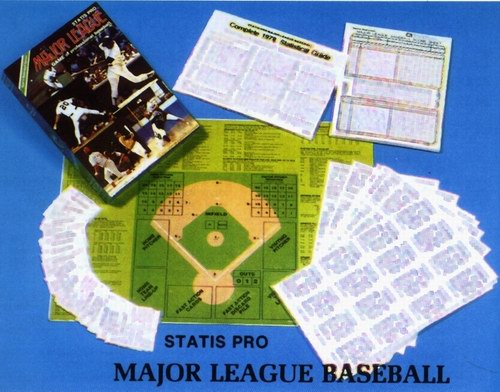You might think the headline was a typo… that it was meant to say, “Bud Selig: The Peter Principle In Action.” Nope. I meant it exactly as I typed it.
You’re all familiar with “the Peter Principle,” right? It’s the organizational principle that states, “in a hierarchy every employee tends to rise to his level of incompetence.” Here’s the Wiki synopsis:
The principle holds that in a hierarchy, members are promoted so long as they work competently. Eventually they are promoted to a position at which they are no longer competent (their “level of incompetence”), and there they remain, being unable to earn further promotions. Peter’s Corollary states that “in time, every post tends to be occupied by an employee who is incompetent to carry out their duties” and adds that “work is accomplished by those employees who have not yet reached their level of incompetence.” “Managing upward” is the concept of a subordinate finding ways to subtly “manage” superiors in order to limit the damage that they end up doing. (emphasis is mine)
There’s a very strong example of the “managing upward” corollary sitting atop Major League Baseball.
I wasn’t at all surprised last month when MLB announced that Bud Selig’s contract had been extended two years. Disappointed? Yes… but far from surprised. In fact, I’ll only be surprised if the MLB team owners eventually do kick Selig out of his office while he’s still breathing.
Why should they? The owners with the most clout (read: owners of teams with the greatest revenue streams) have been successfully “managing upward” for years. If they hired a new Commissioner of Baseball, there’s a pretty good chance that he or she would come in and expect to be able to make decisions in the best interests of baseball. The big market owners sure don’t want that.
Sure, paying a guy $23 million a year to make no decisions might sound like a lot of money, but each team’s share of his salary is less than the price of a below-Replacement Level Player. That’s chump change (an appropriate turn of a phrase in this case) to the bazillionaires who own MLB teams.
But wait, didn’t Bud Selig lead baseball through an unprecedented era of labor peace and didn’t he implement the toughest drug testing program in professional sports? Yes… of course he did. If you actually believe he “decided” any of that, rather than those decisions all being made as part of collective bargaining sessions. I’m sure there was not a lot of unilateral decision making by the Commissioner in those sessions, folks.

- Bud Selig
Then again, Selig’s fingerprints did seem to be all over the Mitchell Report. You remember the Mitchell Report, right? It was Bud’s response to being called in on the carpet by Congress for providing impotent leadership on PEDs. Imagine that… perhaps the most impotent body of “decision makers” in the country criticized Selig for his lack of leadership. That ought to tell you something. The Mitchell Report itself was the kind of work product you would expect from a group with no subpoena power and which leaked almost as many names that ultimately did NOT show up in the report as those who did. (I’m betting Jeff Bagwell still would like to know who he should see about that little matter, since so many HOFvoters seem to think he was “named” in the Mitchell Report.)
Still, maybe we’re being a bit unfair. After all, drug testing and labor negotiations are huge and complicated matters. No one person could have stepped up and unilaterally made the kinds of decisions necessary to work through those issues. Commissioners’ decisions are more geared toward the less complicated, “keep the trains running on time” issues that pop up occasionally, like… well… like how to determine home team in the World Series, I guess. After all, he stepped up and made a great call on that matter, right?
In that vein, here are a few more decisions that you would think the Commissioner should be able to take a swing at:
Playoffs:
The big news in the off-season was that the Astros will be moving to the American League in 2013, as part of a realignment geared toward bringing consistency to the number of teams in each league/division and in scheduling. As part of the reorganization, we’ll have two wild card teams in each league that will play one game against one another to determine which of the wild cards will move in to the Divisional Series. Personally, while it’s been widely criticized, I’m on board with that. But we’ve been waiting for months to find out whether the new playoff format will be implemented this year or not.
Selig apparently wants it implemented now. But there are scheduling challenges and clearly the Networks and the people who would have to address those challenges would have easier lives if MLB waited until 2013 to implement the new format. So, the only way the format will be changed this season is if Bud Selig stands up and says, “just frigging get it done!” Yeah… THAT’S not gonna happen.
So we’ll just continue to sit around and wait without a resolution until it just becomes too late to make any changes and Bud will shrug and say, “I tried.”
The Oakland/San Jose Athletics:
The A’s play in a really bad excuse for a ballpark in a community not inclined to do much to change the situation. Several years ago, their owner decided he wanted to move his team down the road to San Jose, where a new stadium could be built and a “genius” GM like Billy Beane could finally compete on a level playing field with the rest of the league.
The problem is, San Jose is considered part of the “home market” of the San Francisco Giants and the Giants aren’t crazy about letting the A’s move in to “their” market. The Giants gloss over a few things, of course, such as the fact that the reason San Jose is part of their home market is that they asked the Athletics to relinquish THEIR rights to San Jose years ago when the Giants were contemplating moving there, themselves. Then they got a new downtown stadium in San Francisco and their plans (or was it a threat?) to move ended. So now that the Athletics want to move there, instead, the Giants won’t give back the rights to the area.
Sounds like a call that a Commissioner should make, right? After all, we’re talking about deciding a matter in the best interests of baseball.
But Selig couldn’t bring himself to make a decision like this without knowing all the facts, so he established a group to study the matter… THREE YEARS AGO.
Today, there’s still no word from Selig on the issue and, by God, A’s owner Lew Wolff is pissed off and tired of waiting. Word from the Commissioner’s office in December was that a decision was coming by February (no word on whether or not Selig has allowed his staff to flip the calendar pages past January 31 at MLB headquarters).
Still, how important is this to Wolff, compared to the prospect of having a Commissioner who might actually WANT to make decisions? All you need to know is that Wolff voted with his peers to extend Selig’s contract two more years. Maybe you’ll have that decision sometime in 2015, Lew.
Compensation for Theo Epstein:
Last fall, Red Sox GM Theo Epstein was hired by the Cubs to run their team, despite having time remaining on his contract with Boston. The clubs apparently agreed that they would work out compensation later and that, in the unlikely event that they couldn’t work out a deal, the Commissioner would decide.
That was in October. This is February and, surprise, they can’t reach agreement on fair compensation. Boston wants every player in the Cubs organization who’s got a chance of ever being good (yes, both of them) and the Cubs think two old catchers masks should be sufficient.
Of course, what Selig SHOULD have done at the time was is say, “BS! Come to an agreement now or forget about it.” But he didn’t. So now he’s faced with making a decision that will certainly upset one team owner or the other.
So, in true Bud Selig fashion, he’s dragging the process out as long as possible in the apparent hope that people will forget about it. And he may be right… the other 28 owners would like him to forget about it. The last thing they want is for a precedent to be set giving the Commissioner the authority to settle such things.
There is one more little decision that I’d like to see the Commissioner step up and make, but this post has run on long enough for today, so I’ll save the last point for tomorrow. Those of you who’ve been reading my stuff here for a while can probably already guess the issue I’d like Mr. Selig to address, but I’ll leave you with a little hint:
~You can get anything you want at Alice’s Restaurant~
– JC
 St. Peter admitted that Iowa was in the middle of a “Bermuda Triangle” (his words) and that he and the Twins would like to see the situation changed, but the matter is dictated by MLB’s broadcast rights policy and any changes would have to come from league headquarters. He also suggested I write to Iowa’s Congressional delegation.
St. Peter admitted that Iowa was in the middle of a “Bermuda Triangle” (his words) and that he and the Twins would like to see the situation changed, but the matter is dictated by MLB’s broadcast rights policy and any changes would have to come from league headquarters. He also suggested I write to Iowa’s Congressional delegation.





















